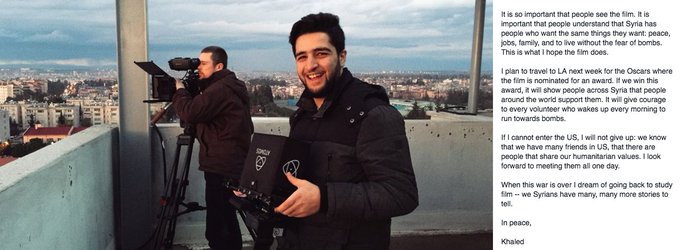Washington: US immigration authorities are barring entry to a 21-year-old Syrian cinematographer who worked on a harrowing film about his nation's civil war, The White Helmets, which has been nominated for an Academy Award.
According to internal Trump administration correspondence seen by the Associated Press, the Department of Homeland Security has decided at the last minute to block Khaled Khatib from travelling to Los Angeles for the Oscars.
Khatib was scheduled to arrive on Saturday in Los Angeles on a Turkish Airlines flight departing from Istanbul. But his plans have been upended after US officials reported finding "derogatory information" regarding him.
Derogatory information is a broad category that can include anything from terror connections to passport irregularities. Asked for comment, a spokeswoman for the Department of Homeland Security, Gillian Christensen, said: "A valid travel document is required for travel to the United States."
The White Helmets, a 40-minute Netflix documentary, has been nominated for Best Documentary Short. If the film wins the Oscar, the award would go to director Orlando von Einsiedel and producer Joanna Natasegara. Khatib is one of three people credited for cinematography.
The film focuses on the rescue workers of the Syrian Civil Defence, who risk their lives to save Syrians affected by civil war. Many of the group's members have been killed by Syrian President Bashar al-Assad's air forces. The group was also nominated for last year's Nobel Peace Prize.
The White Helmets includes emblematic scenes of the deadly six-year conflict: people digging through destroyed homes looking for survivors, at constant risk of "double tap" attacks that target first responders after they've arrived at the scene of a strike.
Khatib said he was a teenager when war broke out in Syria and was inspired to record footage for the White Helmets group after seeing foreign journalists and TV crews travel to his home city of Aleppo to document the civil war.
"I watched them dreaming that I could do that: tell the story of my city and my people," Khatib said in a Facebook post for the nonprofit group the Syria Campaign. "When I saw the work of the White Helmets, I knew that was the story of Syria I wanted to tell the world."
Khatib told CNN that his first mission was a massacre in which more than 100 people were killed: "That was the worst day for me, because I saw the casualties and the bodies of the victims and when I came back to my home I also saw them in my dreams - I saw them when I was awake, and I saw them when I slept."
Raed Saleh & Khaled Khatib of @SyriaCivilDef have received US visas to attend Oscars. This is @995Khaled's story: facebook.com/TheSyriaCampai…
He continued filming, though. "It's easy for anyone to kill someone, but it's very hard and very difficult to save lives," he told CNN.
Khatib had been issued a visa to attend the ceremony with Hollywood's biggest stars. But Turkish authorities detained him this week, according to the internal US government correspondence, and he suddenly needed a passport waiver from the United States to enter the country.
Reached by telephone, Khatib said he was in Istanbul and had not been detained. He declined to speak further about his situation. And a posting on the White Helmets' Twitter account said that "sadly", Khatib would not be able to attend the Oscars
"Not allowed to leave Turkey because passport not issued by Damascus," according to the tweet.
After 3days at airport, not allowed to travel to #oscars2017 - had US visa - but passport not accepted. Sad, but important work to do here.
As recently as last week, Khatib said he planned to travel to Los Angeles for the Oscars in the hopes that a win would inspire those back home.
"If we win this award, it will show people across Syria that people around the world support them," Khatib said on Facebook. "It will give courage to every volunteer who wakes up every morning to run towards bombs.
"If I cannot enter the US, I will not give up: we know that we have many friends in US, that there are people that share our humanitarian values. I look forward to meeting them all one day."
Khatib is not the only person whose Oscars travel plans were affected by Trump's executive order. Iranian director Asghar Farhadi, whose film The Salesman is up for an Academy Award for best foreign film, said in January he would not attend the awards ceremony as a way to protest the "unjust conditions" of Trump's travel ban.





0 comments:
Post a Comment